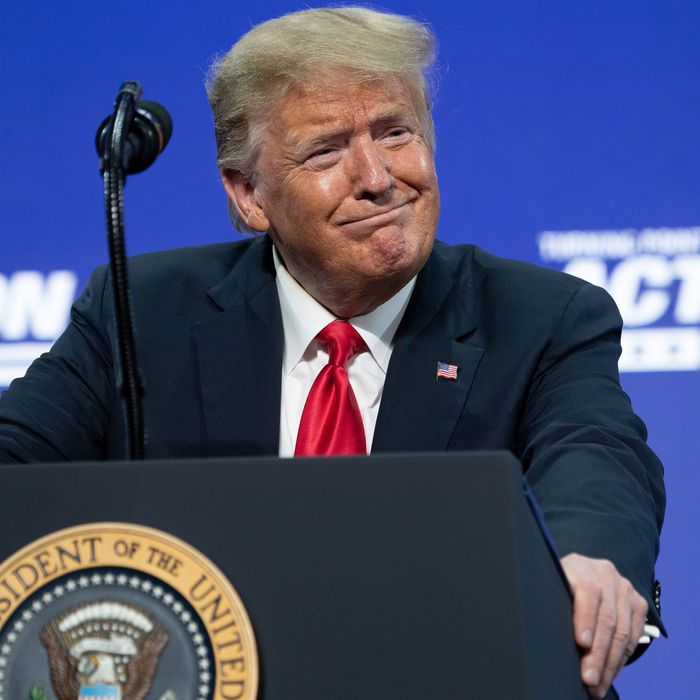Trump Is Seeking Reelection on a Pro-Coronavirus Platform

Trump-COVID 2020. Photo: Saul Loeb/AFP via Getty Images
The novel coronavirus has put Donald Trump’s reelection campaign on life support.
In late February, America’s unemployment rate was at a half-century low, consumer confidence was high, and betting markets were bullish on Trump’s odds of a second term. Four months and 123,000 U.S. coronavirus deaths later, times have changed. Before COVID-19 made its presence in the U.S. felt, Joe Biden led the president by roughly five points in national polls. Today — with tens of millions unemployed, and Houston’s ICUs running out of capacity — the Democrat leads Trump by more than ten.
Like other leaders in afflicted countries, Trump enjoyed a brief polling boost at the onset of the pandemic. But this “rally around the flag” effect started dissipating in early April. The White House ostensibly attributed its declining numbers to the economic consequences of lockdown, rather than the public-health catastrophe it had failed to prevent. Thus, the administration pressured states to expedite reopening, while Trump trumpeted an unproven antimalarial drug as a COVID-19 elixir. In response to these actions, many accused the president of crassly prioritizing his reelection above Americans’ health and safety. This was a plausible critique at the time. But as an assessment of Trump’s handling of the pandemic in recent days, it is actually too generous.
At this point, it is quite clear that Donald Trump’s interest in keeping his job — and the American public’s interest in minimizing the spread of the coronavirus — are perfectly aligned. Formal restrictions on economic activity have been relaxed throughout most of the country. The force that’s holding down the economy (and the president’s poll numbers) is not lockdown orders; it’s the uncontrolled spread of a deadly virus. The more Trump does to curb COVID-19, the better his odds of getting back into contention. Recent polling from the (Democrat-aligned) Global Strategy Group indicates that the voting public is paying close attention to coronavirus case counts. For once, objective facts about a pressing policy challenge are politically salient. Trump can become a more popular president by doing a better job.
But for Donald J. Trump, some things are more important than winning an election — and spreading the novel coronavirus is ostensibly one of them.
One of the most effective — and least economically compromising — ways to contain the pandemic is to encourage universal mask-wearing in public indoor spaces. Instead, Trump has derided masks as both ineffective and anti-conservative. Which is to say: He has actively discouraged his supporters from wearing masks, even as poll after poll shows upward of 70 percent of Americans supporting mask-wearing in public.
Surveys also show that the American public overwhelmingly supports widespread coronavirus testing. And yet, Trump has said that he told his people to “slow down the testing” because it was uncovering too many new cases. After administration officials tried to pass this off as a joke, Trump clarified that he was entirely serious. The White House then confirmed Trump’s sincerity by cutting off federal funding to 13 COVID-19 testing sites, including seven in Texas where a “massive virus outbreak” is currently sweeping the state. Marginally reducing testing capacity will make it harder for states and cities to respond to nascent outbreaks by tightening social-distancing protocols or preparing hospital systems for higher ICU demand. But it won’t do much to disguise the ongoing existence of a public-health crisis.
Most egregiously, Trump has been traveling to coronavirus hotspots across the country, and has ostensibly been trying to orchestrate superspreader events. On Tuesday, the president went to Arizona — where new cases of coronavirus have been growing at a clip of 3,000 a day — and convened a large indoor rally before a mostly unmasked crowd of shouting fans. Actively worsening a public-health crisis in a must-win swing state is an odd thing to do if your goal is to win reelection in November. By contrast, if Trump’s top priority is to help the novel coronavirus be fruitful and multiply, then his Phoenix trip makes perfect sense.
Of course, it is unlikely that Trump is consciously sacrificing his reelection to the higher good of maximizing U.S. COVID-19 deaths. The more probable explanation for his conduct is that the man is simply a delusional, spiteful sociopath. He craves the attention and affirmation he experiences at rallies and is indifferent to the epidemiological consequences of satisfying this appetite. He would like to suppress coronavirus testing because he wants the numbers he sees when watching cable news to be less threatening to his self-esteem than they are at present. His liberal critics are pro-mask, so he is against them. But whatever Trump’s subjective reasoning, it remains the case that his approach to the pandemic is now objectively pro-coronavirus. The U.S. president is seeking reelection on an anti-mask, anti-testing, pro-superspreader-event platform.
Thankfully, at least for now, this does not appear to be a winning strategy.
All the Household-Name Companies That Have Filed for Bankruptcy Due to Coronavirus

Chuck E. Cheese filed for Chapter 11 protection. Photo: Justin Sullivan/Getty Images
Thousands of businesses have been driven to bankruptcy by the coronavirus, and you’ve likely never heard of most of them. But a handful of household names, many of them already struggling before the pandemic, are among the firms closing stores, laying off employees, and restructuring due the economic turmoil created by the virus. And while bankruptcy doesn’t often spell death for large companies, it can sometimes lead to liquidation of the business.
As of Monday, more than 4,000 companies have filed for bankruptcy in 2020, according to BankruptcyData.com. By comparison, 6,800 companies sought Chapter 11 protection all of last year. Experts predict that things are only going to get worse, the Times reports:
Edward I. Altman, the creator of the Z score, a widely used method of predicting business failures, estimated that this year will easily set a record for so-called mega bankruptcies — filings by companies with $1 billion or more in debt. And he expects the number of merely large bankruptcies — at least $100 million — to challenge the record set the year after the 2008 economic crisis.
Here are some of the biggest name firms to file for bankruptcy in 2020:
April
Diamond Offshore and Whiting Petroleum: The two oil companies cited a steep decrease in demand during lockdown and the oil price war between Saudi Arabia and Russia.
May
J.Crew: The Times called J.Crew the coronavirus’s “first major retail casualty” when its parent company filed for Chapter 11 protection in early May. The company has said “day-to-day operations” will continue.
Gold’s Gym: The gym chain proactively closed 30 company-owned gyms in April before declaring for bankruptcy in May. It said the decision will not “prevent us from continuing to support our system of nearly 700 gyms around the world.”
Neiman Marcus: After years of building an unsustainable debt burden, Neiman Marcus was brutalized by the coronavirus, which caused all of its 43 stores to temporarily close. The luxury chain is now considering closures around the country, including in Manhattan, where it opened a three-story, 188,000-square-foot behemoth at Hudson Yards just last year.
J.C. Penney: Prior to coronavirus, the footprint of the once-iconic mall retailer had fallen to less than a quarter of what it was in 2001. After its mid-May bankruptcy filing, it’s going to fall more. The company is planning to shutter 154 stores.
Hertz: If no one is traveling, no one needs to rent a car. Car rental giant Hertz was dealt a “rapid, sudden and dramatic” blow by the coronavirus, the company said in May, leading to the biggest bankruptcy filing of 2020.
Tuesday Morning: Pandemic-inspired shutdowns created an “insurmountable financial hurdle” for the off-price retailer, which is planning to close more than 200 of its 700 stores.
PQ New York: The owner of Le Pain Quotidien closed all 98 of its U.S. locations during the pandemic and sold them to another restaurant company that will reopen 35 of the locations and, presumably, close the rest.
June
GNC: The 85-year-old vitamin retailer saw 30 percent of its stores in the U.S. and Canada temporarily close during the height of the pandemic. The “dramatic negative impact” of these closures led to a bankruptcy filing in late June. Roughly 20 percent, or 1,200 of its 5,800 retail stores will close.
24 Hour Fitness: After its bankruptcy filing on June 14, 24 Hour Fitness will transition 133 of its locations to Zero Hour Fitness. That is to say, they’re closing.
Chuck E. Cheese: On the same day that CEC Entertainment, which owns 550 Chuck E. Cheese and Peter Piper Pizza locations, reopened 266 venues, it also filed for bankruptcy. The company said the filing will allow it to “strengthen our financial structure as we recover from what has undoubtedly been the most challenging event in our company’s history.”
No comments:
Post a Comment